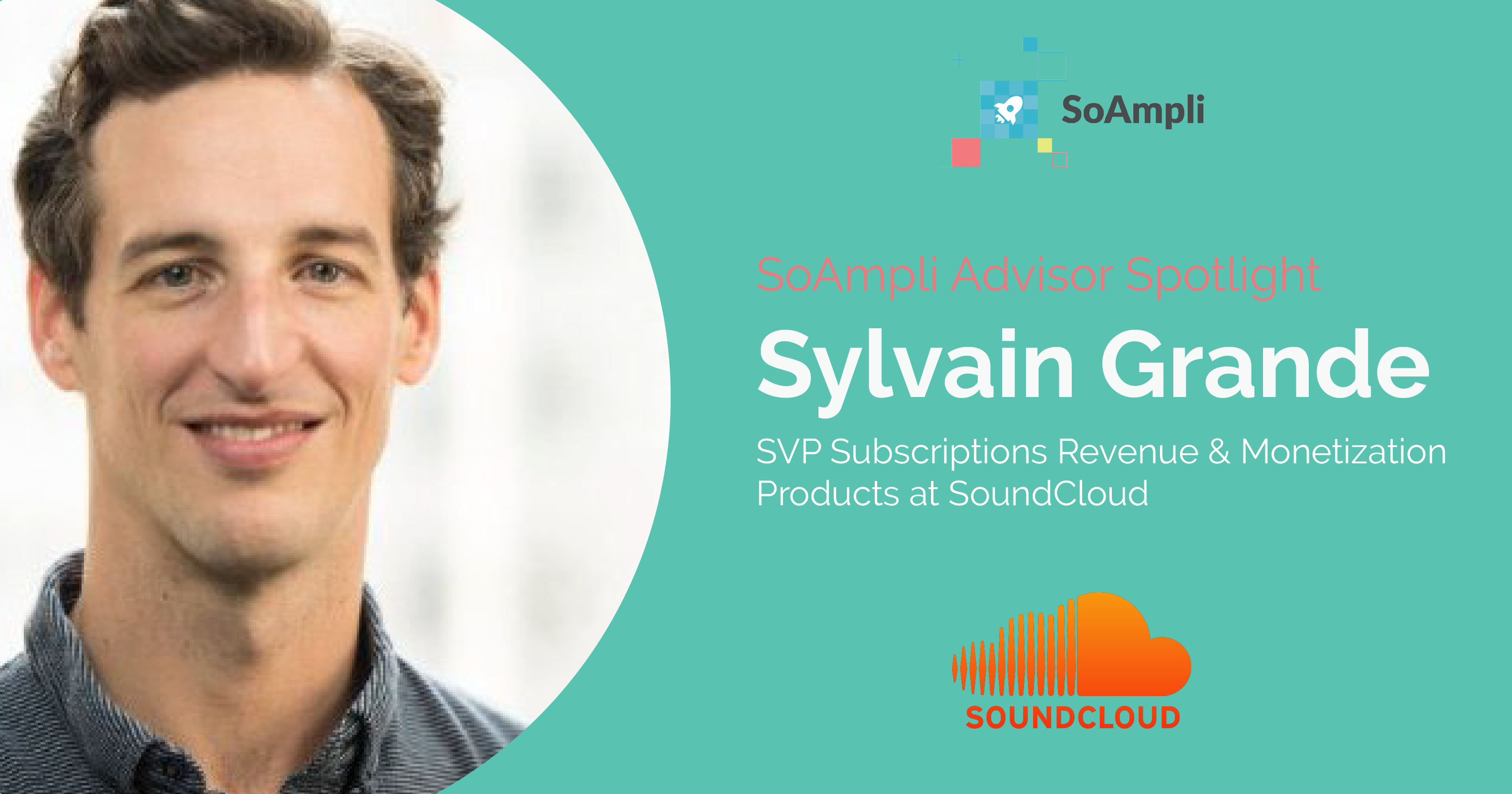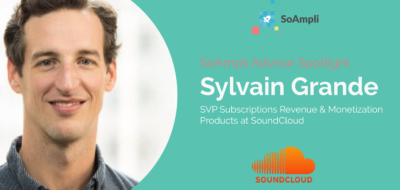From the very beginning of our start-up journey, we have been able to attract some truly amazing advisors. They have helped us develop our vision and shape our message at every step of the way.
Now, our new interview series wants to focus on each one of them at a time, digging deep into their unique field of expertise and into their SoAmpli ‘origin story’.
For the first instalment, we interviewed Sylvain Grande. Originally from France and New York-based, Sylvain is currently SVP of Subscriptions Revenue & Monetization Products at SoundCloud. He crossed paths with SoAmpli for the first time while he was director of business development at MySpace, one of the pioneers of the social media space. We sat down with Sylvain to discuss the global start-up landscape, how and when companies should start worrying about monetising and what made him decide to join the SoAmpli journey more than 2 years ago…

Q: You have quite an impressive background – from MySpace to Nokia HERE, and now as SVP, Subscription Revenue & Monetisation Products at SoundCloud. How have you seen the tech industry evolve over the last 15 years and what are you most excited about in the industry
A: Many publications and people are specialised in analysing and talking about the tech industry evolution. I’d say that at a fundamental level, we’ve seen the technology industry penetrate about every economic sector (as in agriculture, industry verticals, manufacturing, the services sector, government). I believe that one fundamental aspect is that time has accelerated. The pace of change, the polarisation of reactions, the effect on societies, what’s beyond “tech” in technology impact, how do we talk about change in relation to automation, how to bring back the human element in many discussions are certainly the parts that interest me most.
I am excited (and hopeful we can have broad debates, as these are fundamental to our societies and social constructs) about how we can transform government further, how we can empower more small and medium-sized enterprises, how a world with flexible workforce operates at scale, artificial intelligence, biogenomics (even if I understand very little), quantum physics (even if I understand very very little), tech enabling better processes, enabling less concentration of power and more productivity.
Q: As many other companies in the social media space, SoundCloud started as a free platform which only later, after the user base was built, started focusing on monetisation strategies. What are the sectors and kinds of companies that, in your experience, should assume this model? And what timeframe for success should they give themselves?
A: I fundamentally believe in: the need for frameworks (here economic frameworks) AND that all companies and businesses are different (people, history and other parameters). The past ten years have seen the rise of 2-sided marketplaces, from eBay, Youtube to Uber, Etsy, SoundCloud and many others. In general, people have a tendency to oppose business models (e.g. advertising and subscription) and trends change. What is critical is to try to describe the fundamentals of one business and test and iterate on the key choices one needs to make (e.g. the many ways to do freemium).
Q: In your experience, how has the landscape changed over the last 15 years in tech in regards to major investments and development? What are some trends that you can identify?
A: Until roughly 20 years ago, most tech investments came from defence and government, the computer industry and just a few giants like Microsoft. In the past 20 years, with the rise of the likes of Google, Amazon, Facebook and Tencent, a lot of major investments and developments have been carried out by the private sector, in the hands of less than 10 companies. There is a very vibrant ecosystem of startups, but many are acquired before they can scale. In parallel large non-tech corporations have understood (to various extent) the need to invest a lot in digital transformation. This, in aggregate, is likely the biggest source of investment in the decade to come.
Q: As you know, at SoAmpli we are exploring the possibilities of artificial intelligence for social media and social selling content optimisation and engagement. What are your thoughts about the impact of artificial intelligence and machine learning on all aspects of a business? What do you see as the major consequences of this, and which timeline do you see for its development
A: Artificial intelligence is a complex topic. There is no doubt that machine learning and AI can help many parts of a business, but we need to be clear about the different uses of the technology and on the improvements (and specifics) to each topic. Improving customer relationship management through automation power by AI requires a different discussion that improving your search algorithm or designing more effective sales strategies. The tech can lead or simply be a supporting function.
In sales, in particular, leveraging data to help sell more effectively, for targeting purposes and, at times, for automation, is critical and everyone now understands that, at least on a theoretical level. However, a lot of education still needs to happen to help legacy processes, organisations and people move together to the next phases.
Q: And now, a little bit about you and SoAmpli… How did it all start? What made you decide to join our adventure? And what are you most excited about for the future of our start-up?
A: It is all about Maz. We interacted when I was at MySpace in the UK and I have huge respect for him. He asked me to support, to be a sounding part on things product, product strategy and tech related and I gladly accepted.
It is incredible to have seen SoAmpli grow from an idea to having and retaining (at exceptional levels) customers. And to see that many good things are ahead.







